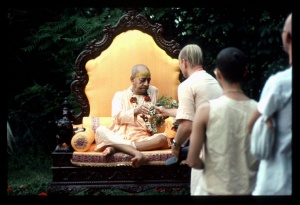CC Adi 14.38 (1975)

A.C. Bhaktivedanta Swami Prabhupada
TEXT 38
- core lañā gela prabhuke bāhire pāiyā
- tāra skandhe caḍi' āilā tāre bhulāiyā
SYNONYMS
core—two thieves; lañā—taking; gela—went; prabhuke—the Lord; bāhire—outside; pāiyā—finding Him; tāra—their; skandhe—on the shoulders; caḍi'-rising; āilā—came back; tāre—them; bhulāiyā—misleading.
TRANSLATION
In His childhood the Lord was taken away by two thieves outside His home. The Lord, however, got up on the shoulders of the thieves, and while they were thinking they were safely carrying the child to rob His ornaments, the Lord misled them, and thus instead of going to their own home the thieves came back to the home of Jagannātha Miśra.
PURPORT
In His childhood the Lord was profusely decorated with gold ornaments. Once upon a time He was playing outside His house, and two thieves passing on the street saw the opportunity to rob the Lord and therefore took Him on their shoulders, pleasing Him by offering Him some sweetmeats. The thieves thought they would carry the child to the forest and then kill Him and take away the ornaments. The Lord, however, expanded His illusory energy upon the thieves, so much so that instead of carrying Him to the forest they came right back in front of His house. When they came before His house they became afraid because everyone from the house of Jagannātha Miśra and all the inhabitants of that quarter were busy searching for the child. Therefore the thieves, thinking it dangerous to remain, went away and left Him. The child was brought within the house and given to mother Śacī, who was in great anxiety, and she became satisfied. This incident is also very elaborately explained in the Ādi-līlā of Caitanya-bhāgavata, Third Chapter.